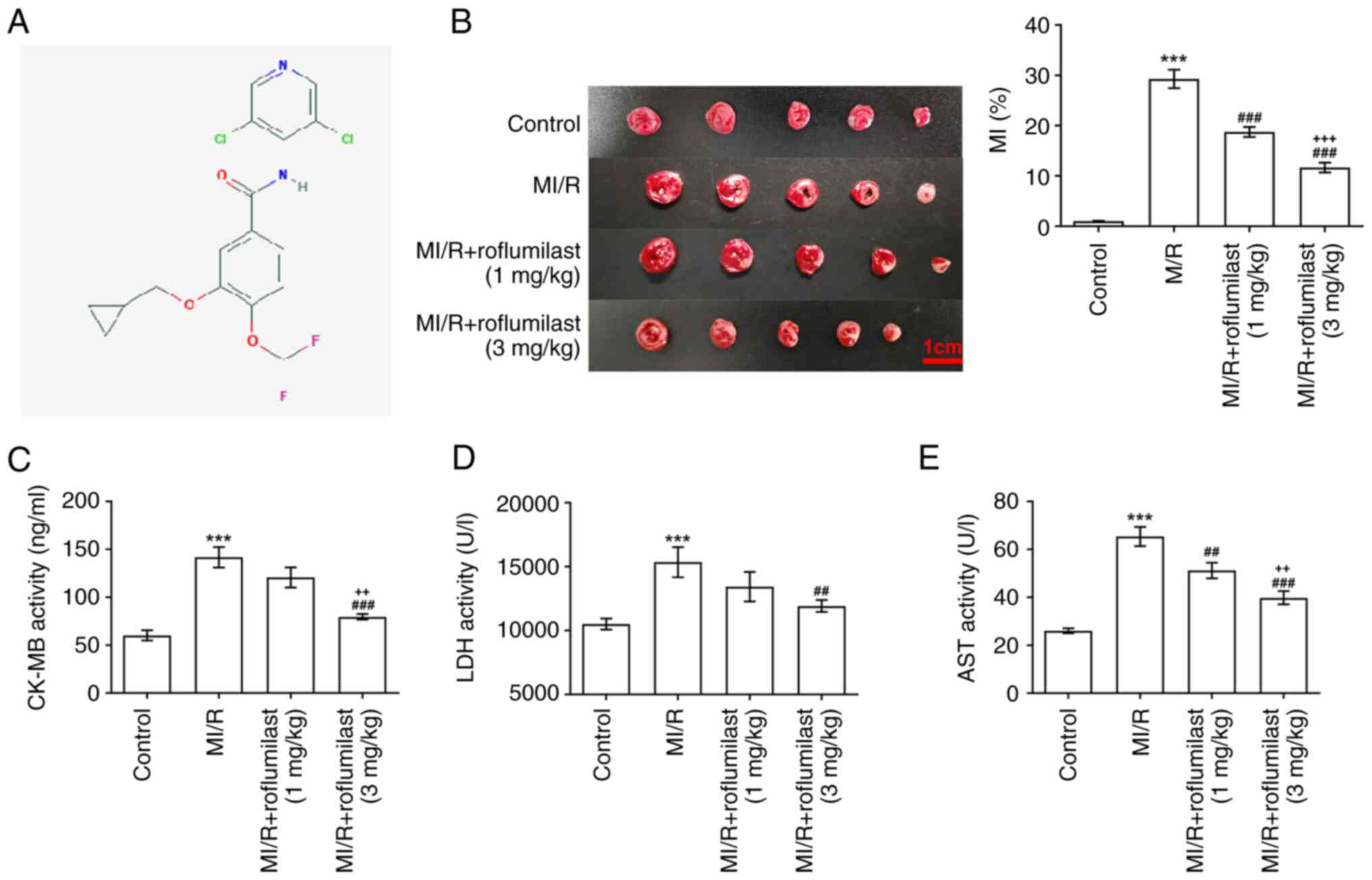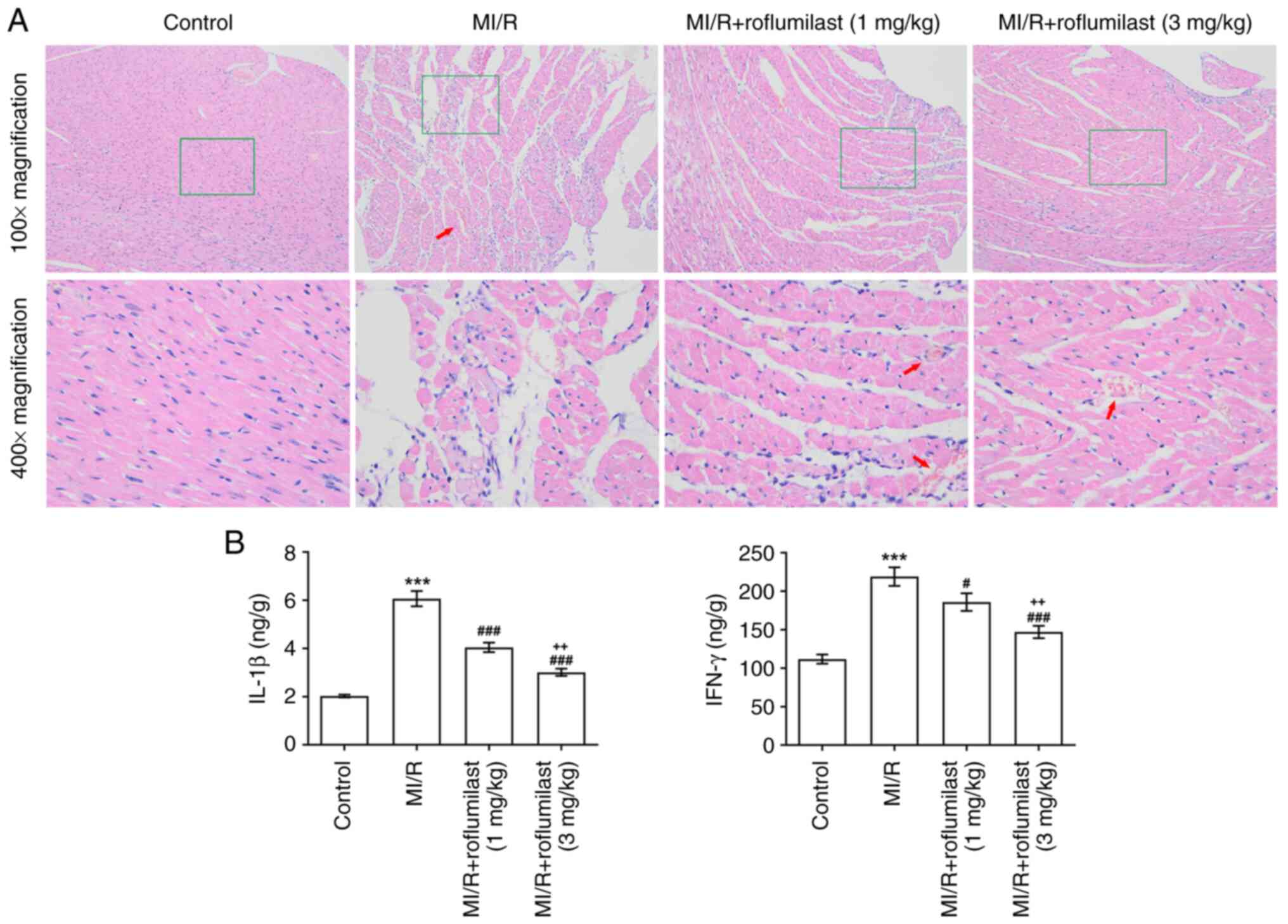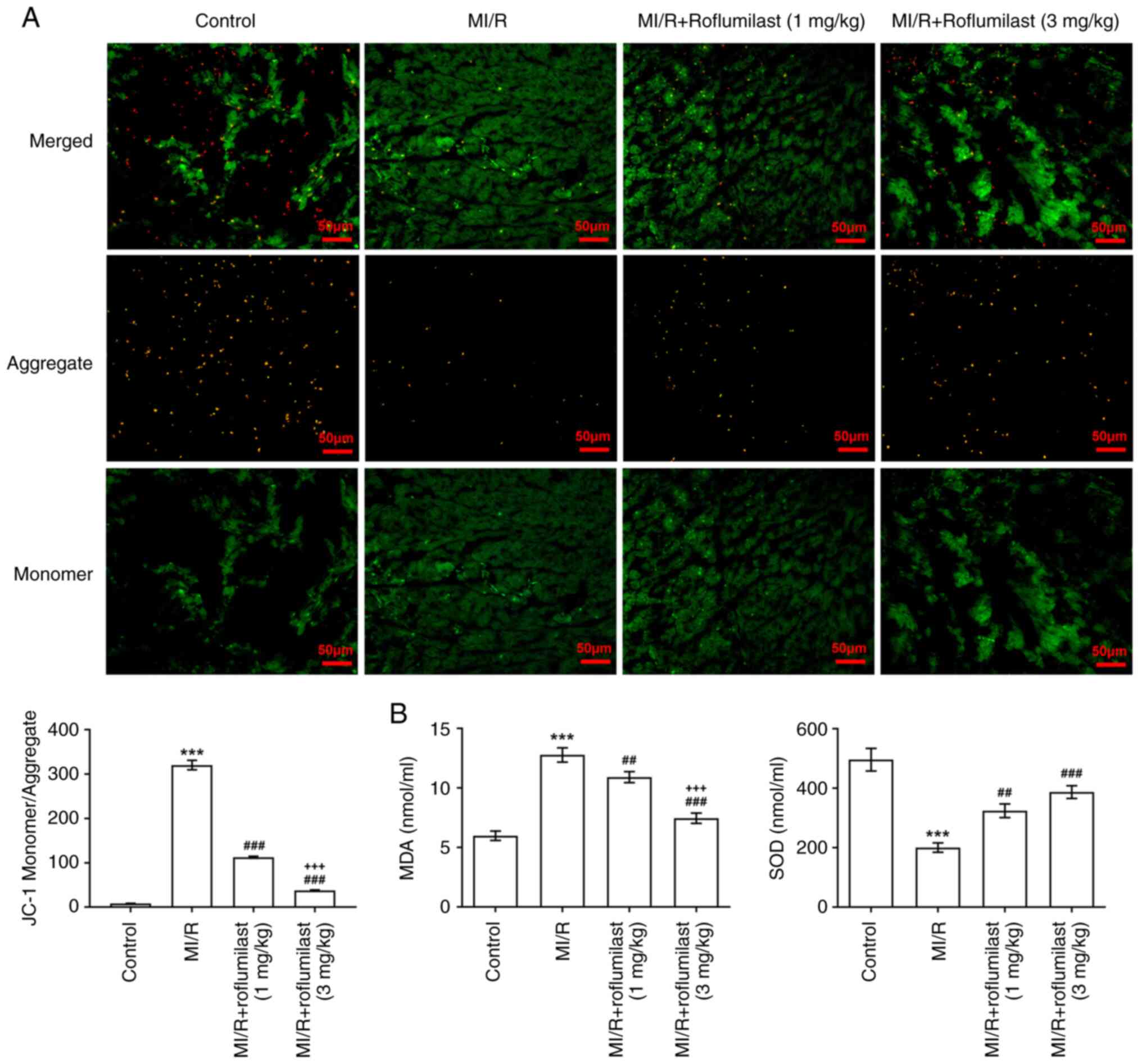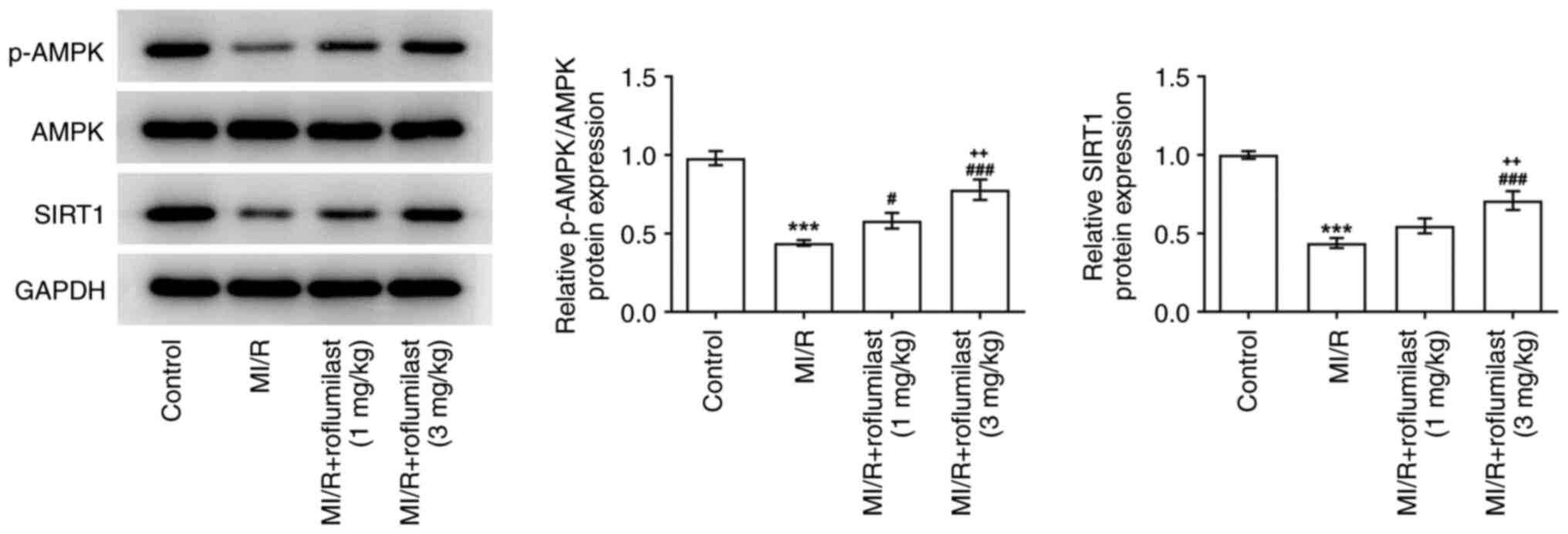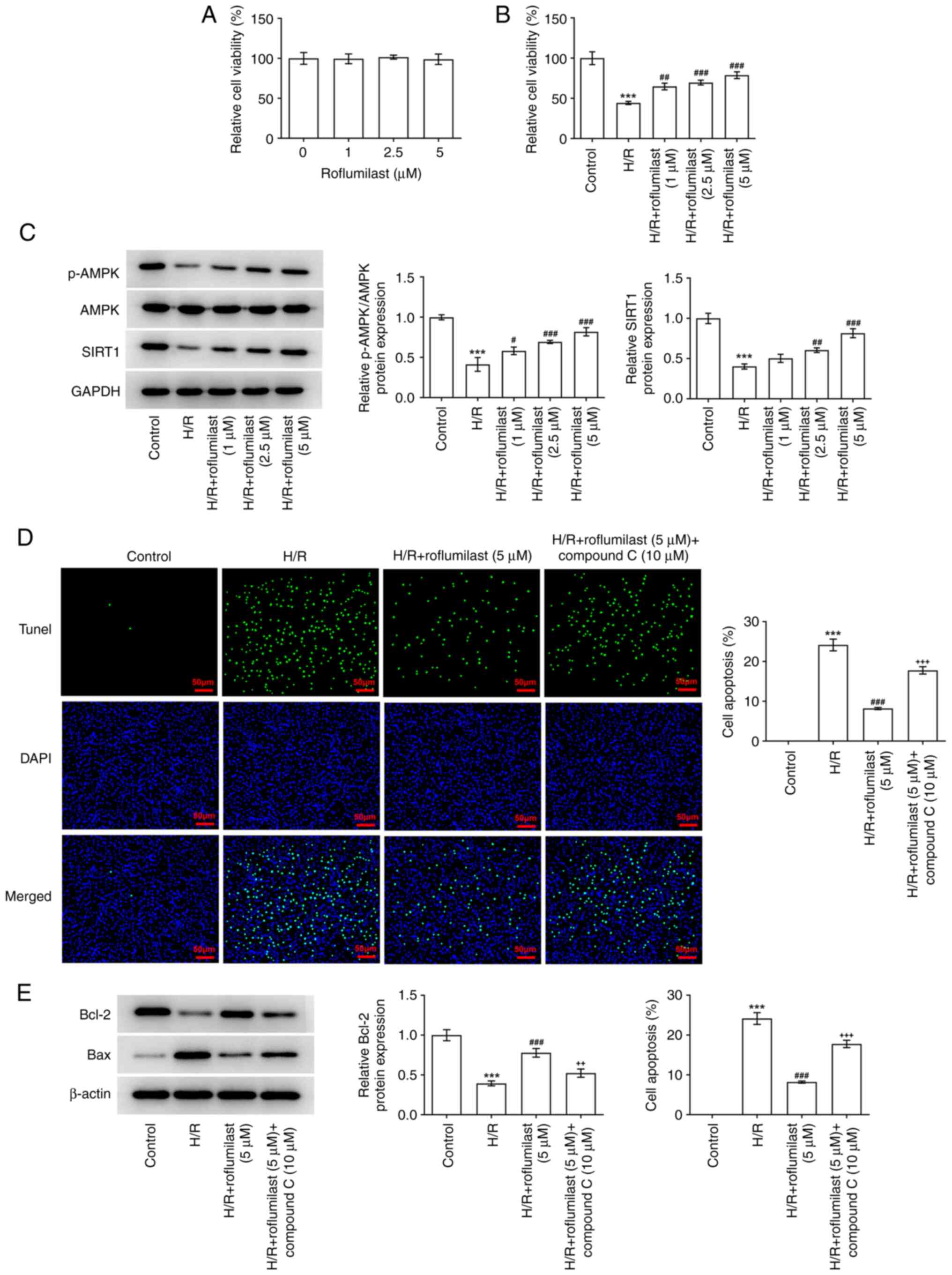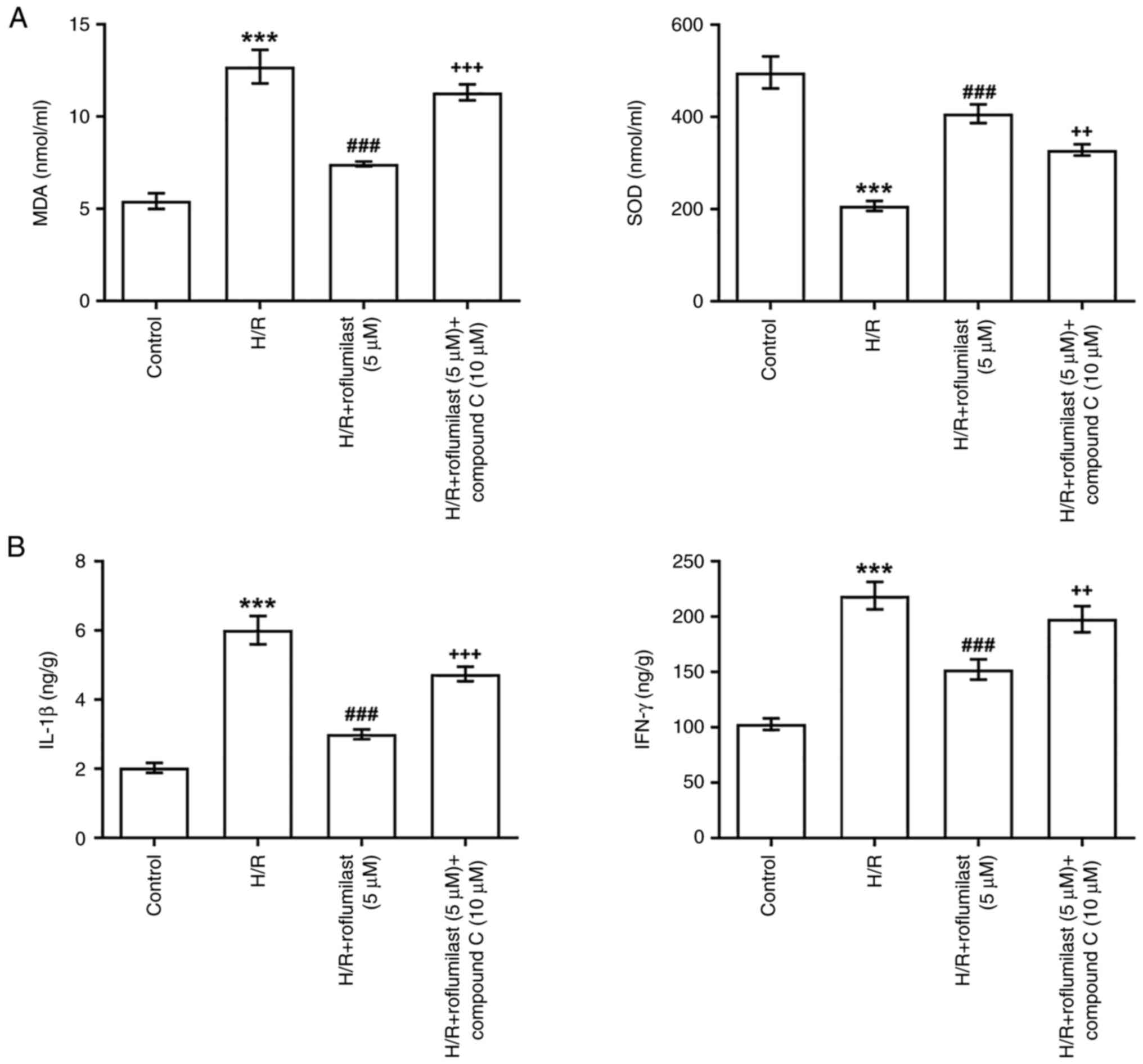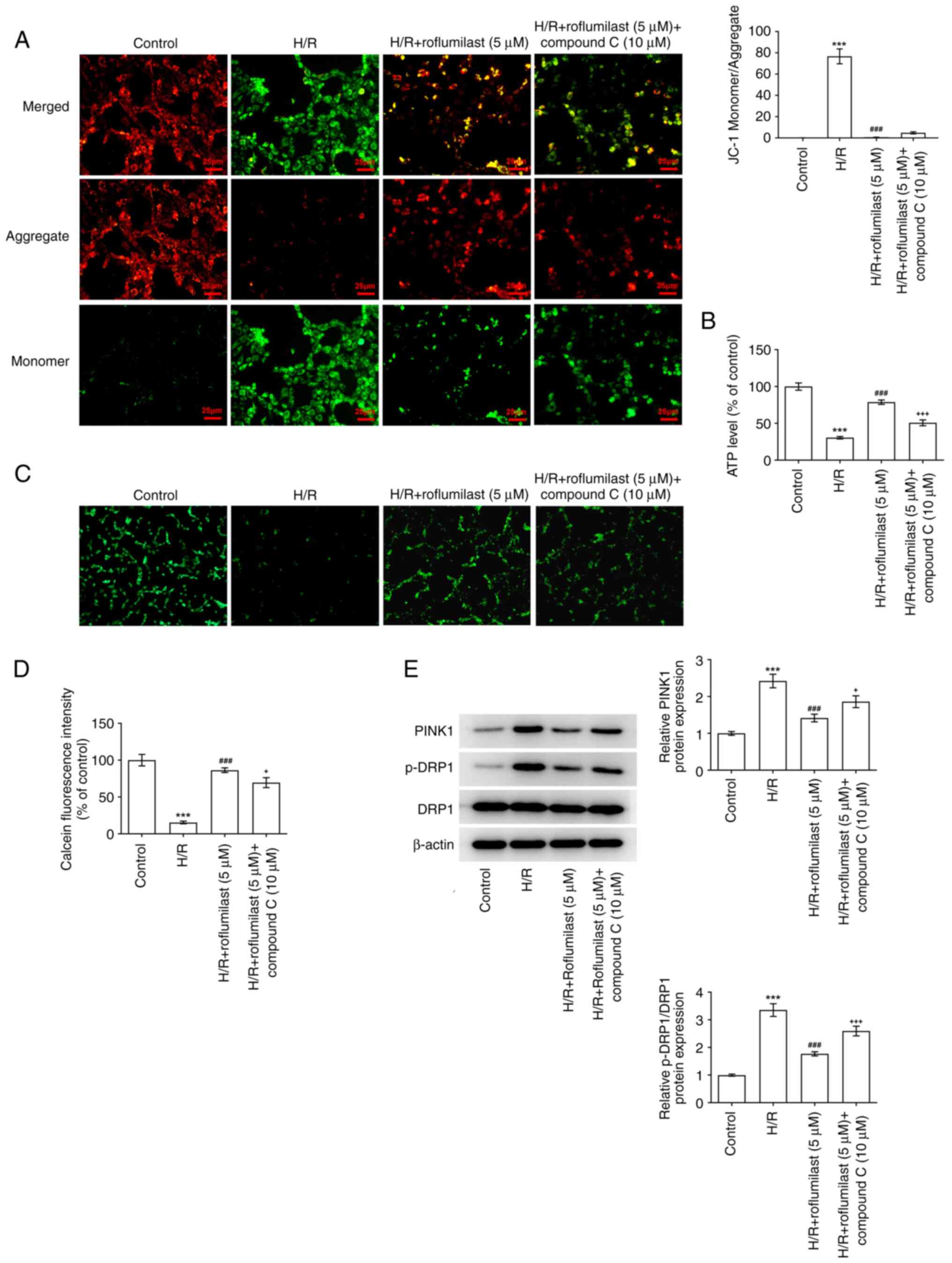|
1
|
Weinberger T and Schulz C: Myocardial
infarction: A critical role of macrophages in cardiac remodeling.
Front Physiol. 6(107)2015.PubMed/NCBI View Article : Google Scholar
|
|
2
|
Anderson JL, Adams CD, Antman EM, Bridges
CR, Califf RM, Casey DE Jr, Chavey WE II, Fesmire FM, Hochman JS,
Levin TN, et al: ACC/AHA 2007 guidelines for the management of
patients with unstable angina/non-ST-Elevation myocardial
infarction: A report of the American college of cardiology/american
heart association task force on practice guidelines (Writing
Committee to Revise the 2002 Guidelines for the Management of
Patients With Unstable Angina/Non-ST-Elevation Myocardial
Infarction) developed in collaboration with the American college of
emergency physicians, the society for cardiovascular angiography
and interventions, and the society of Thoracic surgeons endorsed by
the American association of cardiovascular and pulmonary
rehabilitation and the society for academic emergency medicine. J
Am Coll Cardiol. 50:e1–e157. 2007.PubMed/NCBI View Article : Google Scholar
|
|
3
|
Hu S, Gao R, Liu L, Zhu M, Wang W, Wang Y,
Wu Z, Li H, Gu D, Yang Y, et al: Summary of the 2018 report on
cardiovascular diseases in China. Chin Circulat J. 34:209–220.
2019.PubMed/NCBI View Article : Google Scholar : (In Chinese).
|
|
4
|
Liu S, Li Y, Zeng X, Wang H, Yin P, Wang
L, Liu Y, Liu J, Qi J, Ran S, et al: Burden of cardiovascular
diseases in China, 1990-2016: Findings from the 2016 global burden
of disease study. JAMA Cardiol. 4:342–352. 2019.PubMed/NCBI View Article : Google Scholar
|
|
5
|
Wu Y, Li S, Patel A, Li X, Du X, Wu T,
Zhao Y, Feng L, Billot L, Peterson ED, et al: Effect of a quality
of care improvement initiative in patients with acute coronary
syndrome in resource-constrained hospitals in China: A randomized
clinical trial. JAMA Cardiol. 4:418–427. 2019.PubMed/NCBI View Article : Google Scholar
|
|
6
|
Farah A and Barbagelata A: Unmet goals in
the treatment of acute myocardial infarction: Review. F1000Res 6:
Faculty Rev-1243, 2017.
|
|
7
|
Hausenloy DJ and Yellon DM: Myocardial
ischemia-reperfusion injury: A neglected therapeutic target. J Clin
Invest. 123:92–100. 2013.PubMed/NCBI View
Article : Google Scholar
|
|
8
|
Yellon DM and Hausenloy DJ: Myocardial
reperfusion injury. N Engl J Med. 357:1121–1135. 2007.PubMed/NCBI View Article : Google Scholar
|
|
9
|
Janjua S, Fortescue R and Poole P:
Phosphodiesterase-4 inhibitors for chronic obstructive pulmonary
disease. Cochrane Database Syst Rev. 5(CD002309)2020.PubMed/NCBI View Article : Google Scholar
|
|
10
|
Xu B, Xu J, Cai N, Li M, Liu L, Qin Y, Li
X and Wang H: Roflumilast prevents ischemic stroke-induced neuronal
damage by restricting GSK3β-mediated oxidative stress and
IRE1α/TRAF2/JNK pathway. Free Radic Biol Med. 163:281–296.
2021.PubMed/NCBI View Article : Google Scholar
|
|
11
|
Xu X, Liao L, Hu B, Jiang H and Tan M:
Roflumilast, a phosphodiesterases-4 (PDE4) inhibitor, alleviates
sepsis-induced acute kidney injury. Med Sci Monit.
26(e921319)2020.PubMed/NCBI View Article : Google Scholar
|
|
12
|
Kwak HJ, Park KM, Choi HE, Chung KS, Lim
HJ and Park HY: PDE4 inhibitor, roflumilast protects cardiomyocytes
against NO-induced apoptosis via activation of PKA and Epac dual
pathways. Cell Signal. 20:803–814. 2008.PubMed/NCBI View Article : Google Scholar
|
|
13
|
Ansari MN, Ganaie MA, Rehman NU, Alharthy
KM, Khan TH, Imam F, Ansari MA, Al-Harbi NO, Jan BL, Sheikh IA and
Hamad AM: Protective role of Roflumilast against cadmium-induced
cardiotoxicity through inhibition of oxidative stress and NF-κB
signaling in rats. Saudi Pharm J. 27:673–681. 2019.PubMed/NCBI View Article : Google Scholar
|
|
14
|
Zhang S, Wu P, Liu J, Du Y and Yang Z:
Roflumilast attenuates doxorubicin-induced cardiotoxicity by
targeting inflammation and cellular senescence in cardiomyocytes
mediated by SIRT1. Drug Des Devel Ther. 15:87–97. 2021.PubMed/NCBI View Article : Google Scholar
|
|
15
|
Perrelli MG, Pagliaro P and Penna C:
Ischemia/reperfusion injury and cardioprotective mechanisms: Role
of mitochondria and reactive oxygen species. World J Cardiol.
3:186–200. 2011.PubMed/NCBI View Article : Google Scholar
|
|
16
|
Penna C, Perrelli MG and Pagliaro P:
Mitochondrial pathways, permeability transition pore, and redox
signaling in cardioprotection: Therapeutic implications. Antioxid
Redox Signal. 18:556–599. 2013.PubMed/NCBI View Article : Google Scholar
|
|
17
|
Kyung SY, Kim YJ, Son ES, Jeong SH and
Park JW: The phosphodiesterase 4 inhibitor roflumilast protects
against cigarette smoke extract-induced mitophagy-dependent cell
death in epithelial cells. Tuberc Respir Dis (Seoul). 81:138–147.
2018.PubMed/NCBI View Article : Google Scholar
|
|
18
|
Zhou H, Zhang Y, Hu S, Shi C, Zhu P, Ma Q,
Jin Q, Cao F, Tian F and Chen Y: Melatonin protects cardiac
microvasculature against ischemia/reperfusion injury via
suppression of mitochondrial fission-VDAC1-HK2-mPTP-mitophagy axis.
J Pineal Res. 63(e12413)2017.PubMed/NCBI View Article : Google Scholar
|
|
19
|
Tian L, Cao W, Yue R, Yuan Y, Guo X, Qin
D, Xing J and Wang X: Pretreatment with Tilianin improves
mitochondrial energy metabolism and oxidative stress in rats with
myocardial ischemia/reperfusion injury via AMPK/SIRT1/PGC-1 alpha
signaling pathway. J Pharmacol Sci. 139:352–360. 2019.PubMed/NCBI View Article : Google Scholar
|
|
20
|
Tikoo K, Lodea S, Karpe PA and Kumar S:
Calorie restriction mimicking effects of roflumilast prevents
diabetic nephropathy. Biochem Biophys Res Commun. 450:1581–1586.
2014.PubMed/NCBI View Article : Google Scholar
|
|
21
|
Qian L, Shi J, Zhang C, Lu J, Lu X, Wu K,
Yang C, Yan D, Zhang C, You Q, et al: Downregulation of RACK1 is
associated with cardiomyocyte apoptosis after myocardial
ischemia/reperfusion injury in adult rats. In Vitro Cell Dev Biol
Anim. 52:305–313. 2016.PubMed/NCBI View Article : Google Scholar
|
|
22
|
Tahrir FG, Langford D, Amini S, Ahooyi TM
and Khalili K: Mitochondrial quality control in cardiac cells:
Mechanisms and role in cardiac cell injury and disease. J Cell
Physiol. 234:8122–8133. 2019.PubMed/NCBI View Article : Google Scholar
|
|
23
|
Seidlmayer LK, Juettner VV, Kettlewell S,
Pavlov EV, Blatter LA and Dedkova EN: Distinct mPTP activation
mechanisms in ischaemia-reperfusion: Contributions of Ca2+, ROS,
pH, and inorganic polyphosphate. Cardiovasc Res. 106:237–248.
2015.PubMed/NCBI View Article : Google Scholar
|
|
24
|
Ong SB and Hausenloy DJ: Mitochondrial
dynamics as a therapeutic target for treating cardiac diseases.
Handb Exp Pharmacol. 240:251–279. 2017.PubMed/NCBI View Article : Google Scholar
|
|
25
|
Vásquez-Trincado C, García-Carvajal I,
Pennanen C, Parra V, Hill JA, Rothermel BA and Lavandero S:
Mitochondrial dynamics, mitophagy and cardiovascular disease. J
Physiol. 594:509–525. 2016.PubMed/NCBI View
Article : Google Scholar
|
|
26
|
Shoshan-Barmatz V and De S: Mitochondrial
VDAC, the Na(+)/Ca(2+) exchanger, and the Ca(2+) uniporter in
Ca(2+) dynamics and signaling. Adv Exp Med Biol. 981:323–347.
2017.PubMed/NCBI View Article : Google Scholar
|
|
27
|
Li Y and Liu X: Novel insights into the
role of mitochondrial fusion and fission in cardiomyocyte apoptosis
induced by ischemia/reperfusion. J Cell Physiol. 233:5589–5597.
2018.PubMed/NCBI View Article : Google Scholar
|
|
28
|
Maneechote C, Palee S, Chattipakorn SC and
Chattipakorn N: Roles of mitochondrial dynamics modulators in
cardiac ischaemia/reperfusion injury. J Cell Mol Med. 21:2643–2653.
2017.PubMed/NCBI View Article : Google Scholar
|
|
29
|
Leucker TM, Bienengraeber M, Muravyeva M,
Baotic I, Weihrauch D, Brzezinska AK, Warltier DC, Kersten JR and
Pratt PF Jr: Endothelial-cardiomyocyte crosstalk enhances
pharmacological cardioprotection. J Mol Cell Cardiol. 51:803–811.
2011.PubMed/NCBI View Article : Google Scholar
|
|
30
|
Hardie DG: AMPK: Positive and negative
regulation, and its role in whole-body energy homeostasis. Curr
Opin Cell Biol. 33:1–7. 2015.PubMed/NCBI View Article : Google Scholar
|
|
31
|
Zhao B, Qiang L, Joseph J, Kalyanaraman B,
Viollet B and He YY: Mitochondrial dysfunction activates the AMPK
signaling and autophagy to promote cell survival. Genes Dis.
3:82–87. 2016.PubMed/NCBI View Article : Google Scholar
|
|
32
|
Hwang JT, Kwon DY, Park OJ and Kim MS:
Resveratrol protects ROS-induced cell death by activating AMPK in
H9c2 cardiac muscle cells. Genes Nutr. 2:323–326. 2008.PubMed/NCBI View Article : Google Scholar
|
|
33
|
Sasaki H, Asanuma H, Fujita M, Takahama H,
Wakeno M, Ito S, Ogai A, Asakura M, Kim J, Minamino T, et al:
Metformin prevents progression of heart failure in dogs: Role of
AMP-activated protein kinase. Circulation. 119:2568–2577.
2009.PubMed/NCBI View Article : Google Scholar
|
|
34
|
Wang XF, Zhang JY, Li L and Zhao XY:
Beneficial effects of metformin on primary cardiomyocytes via
activation of adenosine monophosphate-activated protein kinase.
Chin Med J (Engl). 124:1876–1884. 2011.PubMed/NCBI
|
|
35
|
Yeh CH, Chen TP, Wang YC, Lin YM and Fang
SW: AMP-activated protein kinase activation during
cardioplegia-induced hypoxia/reoxygenation injury attenuates
cardiomyocytic apoptosis via reduction of endoplasmic reticulum
stress. Mediators Inflamm. 2010(130636)2010.PubMed/NCBI View Article : Google Scholar
|
|
36
|
Chen MB, Wu XY, Gu JH, Guo QT, Shen WX and
Lu PH: Activation of AMP-activated protein kinase contributes to
doxorubicin-induced cell death and apoptosis in cultured myocardial
H9c2 cells. Cell Biochem Biophys. 60:311–322. 2011.PubMed/NCBI View Article : Google Scholar
|
|
37
|
Chin JT, Troke JJ, Kimura N, Itoh S, Wang
X, Palmer OP, Robbins RC and Fischbein MP: A novel cardioprotective
agent in cardiac transplantation: Metformin activation of
AMP-activated protein kinase decreases acute ischemia-reperfusion
injury and chronic rejection. Yale J Biol Med. 84:423–432.
2011.PubMed/NCBI
|
|
38
|
Kim AS, Miller EJ, Wright TM, Li J, Qi D,
Atsina K, Zaha V, Sakamoto K and Young LH: A small molecule AMPK
activator protects the heart against ischemia-reperfusion injury. J
Mol Cell Cardiol. 51:24–32. 2011.PubMed/NCBI View Article : Google Scholar
|
|
39
|
McGaffin KR, Witham WG, Yester KA, Romano
LC, O'Doherty RM, McTiernan CF and O'Donnell CP: Cardiac-specific
leptin receptor deletion exacerbates ischaemic heart failure in
mice. Cardiovasc Res. 89:60–71. 2011.PubMed/NCBI View Article : Google Scholar
|
|
40
|
Kosutova P, Mikolka P, Kolomaznik M,
Balentova S, Adamkov M, Calkovska A and Mokra D: Reduction of lung
inflammation, oxidative stress and apoptosis by the PDE4 inhibitor
roflumilast in experimental model of acute lung injury. Physiol
Res. 67:S645–S654. 2018.PubMed/NCBI View Article : Google Scholar
|
|
41
|
Kahles F, Mllmann J, Bck C, Liberman A and
Lehrke M: The PDE-4 Inhibitor Roflumilast reduces weight gain,
enhances insulin sensitivity and prevents hepatic steatosis in mice
by increasing mitochondrogenesis. Diabetologie Und Stoffwechsel.
9:1993–2003. 2014.
|
|
42
|
Rezvanfar MA, Rezvanfar MA, Ranjbar A,
Baeeri M, Mohammadirad A and Abdollahi M: Biochemical evidence on
positive effects of rolipram a phosphodiesterase-4 inhibitor in
malathion-induced toxic stress in rat blood and brain mitochondria.
Pesticide Biochemistry & Physiology. 98:135–143. 2010.
|
|
43
|
Xu W, Zhang J and Xiao J: Roflumilast
suppresses adipogenic differentiation via AMPK mediated pathway.
Front Endocrinol (Lausanne). 12(662451)2021.PubMed/NCBI View Article : Google Scholar
|















